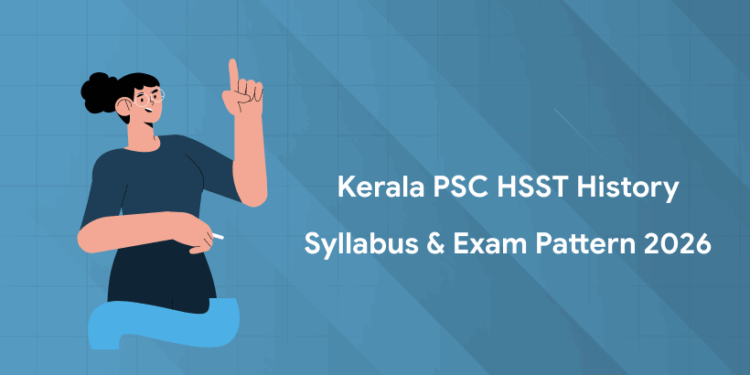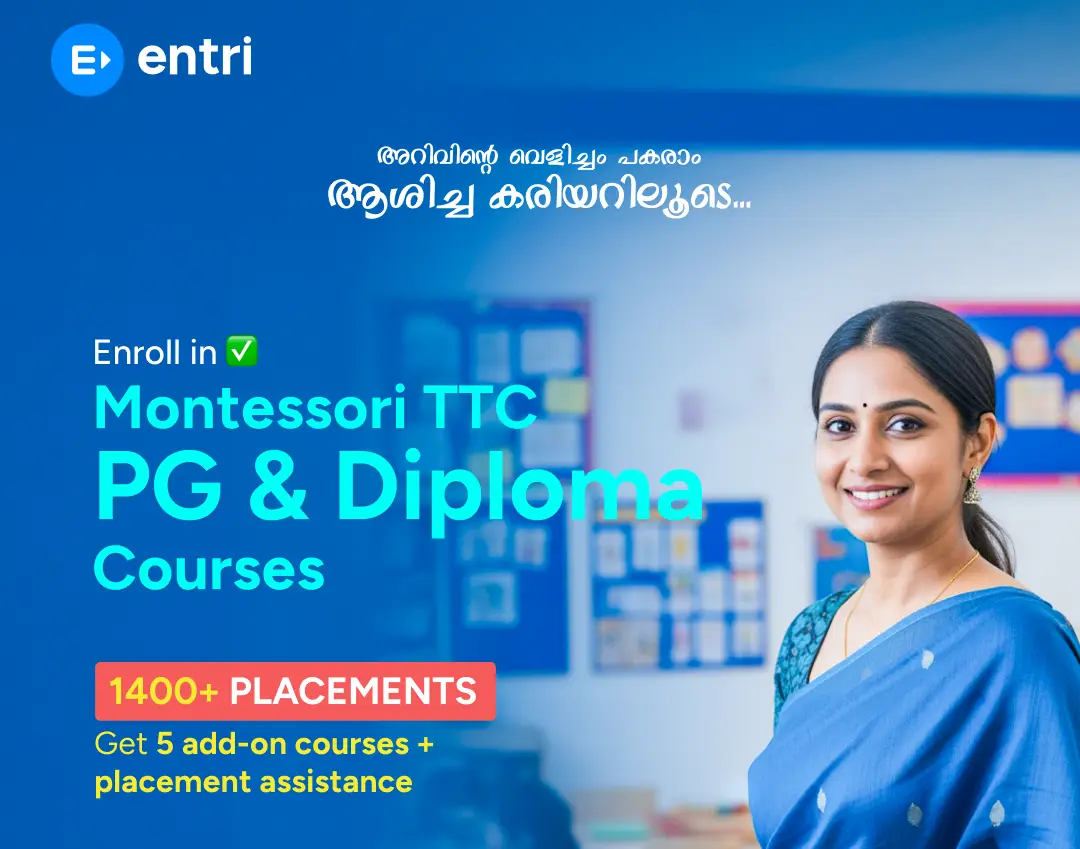Table of Contents
The Kerala Public Service Commission (PSC) has recently released the latest syllabus and exam pattern for the Higher Secondary School Teacher (HSST) History exam 2026. The syllabus includes detailed information on the topics that will be covered in the exam, while the exam pattern outlines the duration, type of questions, and marking scheme. It can be downloaded from the Kerala PSC website. Eligible candidates can download the PDF as earlier and start peparing now. Good luck!
Enroll in Entri for HSST History Online Coaching!
Kerala PSC HSST History Recruitment 2026 Overview
| Kerala PSC HSST History Recruitment 2026 Notification Details | |
|---|---|
| Recruiting Body | Kerala Public Service Commission (Kerala PSC) |
| Recruiting Organization | Kerala Higher Secondary Education |
| Job Type | Kerala Govt. Service |
| Recruitment Type | Direct Recruitment |
| Category Number | Various |
| Post Name | Higher Secondary School Teacher in History |
| Total Vacancy | Anticipated vacancies |
| Job Location | All Over Kerala |
| Salary | As per notification |
| Apply Mode | Online |
| Gazette Date | Notify Later |
| Last date for submission of the application | Notify Later |
| Official website | https://www.keralapsc.gov.in/ |
Kerala PSC HSST History Syllabus 2026 PDF – Expected
1: The first recipient of the ‘Rajiv Gandhi Khel Ratna’ award?
Looking for the Kerala PSC HSST History Syllabus 2026? Download the HSST History Syllabus 2026 by clicking on the link provided below.
Enroll in Kerala's Top-rated HSA Coaching Program!
സർക്കാർ ജോലി എന്ന സ്വപ്നം ഇനി സ്വപ്നം മാത്രമല്ല! Join Entri's HSA Coaching Program
Join Now!Kerala PSC HSST History Exam Pattern 2026
The Kerala Public Service Commission (KPSC) has released the updated exam pattern for the Higher Secondary School Teacher (HSST) History recruitment test 2026.
Key Details:
- Mode of Exam: Offline (OMR-based)
- Duration: 1 hour 15 minutes
- Total Questions: 100 (Objective Type – Multiple Choice)
- Total Marks: 100
- Negative Marking: 0.33 marks will be deducted for each wrong answer
Topic Coverage:
The question paper will assess candidates’ depth of knowledge and conceptual clarity in the following areas:
- Historiography
- World History
- Early Indian History
- Medieval Indian History
- Modern Indian History
- Kerala History
Selection Process:
Candidates must secure marks above the prescribed cut-off to qualify for the next stages:
- Written Test
- Interview
- Document Verification
Kerala PSC HSST History Detailed Syllabus 2026
PART 1
Module I: Historiography (10 Marks)
- Greco- Roman Historiography
- Medieval Historiography- St Augustine and Ibn Khaldun
- Rene Descartes- Anti- Cartesians- Giambattista Vico
- Enlightenment Historiography- Romanticist Historiography
- Positivism
- Marxist Approaches- Classical Marxists- Frankfurt School- History From Below-Structural
- Marxism
- Annales School- Origins- Generations- History of Mentalities
- Post Modern Approaches
- Subaltern Historiography
- Historical Consciousness in Early India- Itihas- Purana Traditions- Kavya Traditions- Charitas-
- Historical Consciousness in Medieval India- Sultanate- Mughal Historiography- Mangalkabya
- Modern Indian Historiography- Colonial Historiography- Nationalist
- Historiograpy- Marxist
- Approaches – Subaltern Studies- Gender Approaches
Module II: World History (10 Marks)
- Paleolithic Age- Mesolithic Age- Neolithic Age- Chalcolithic Age
- Neolithic Revolution
- Urbanization Features- Bronze Age Civilizations- Mesopotamia, Egypt and China
- Greco- Roman Civilizations
- Decline of the Ancient
- Feudal Society- Features
- Church in the History of Europe
- Chinese and Arab Civilizations
- Decline of Feudalism and Transitions into the Modern Age
- Renaissance, Reformation
- Geographical explorations and Establishment of Colonies
- Scientific Revolution
- Agricultural and Industrial Revolutions
- Political Revolutions- Glorious Revolution, American Revolution, French Revolution, Russian
- Revolution and Chinese Revolution
- Rise of Nation States
- First World War and League of Nations
- Rise of Fascism and Nazism
- Second World War and UNO
- Cold War- NAM- Decline of Soviet Union and Emergence of New World Order
- West Asian Crises
- Globalization
Module III: 1) Early India (5 Marks)
- Indus Valley Civilization- Origins- Mature Phase and Decline
- Vedic and Later Vedic Ages
- Age of Mahajanapadhas
- Sramanic Sects and the role they played in India
- Rise of Magadha- Mauryan Rule
- Developments in North West India
- Indian Feudalism
- Guptas in Indian History- The Golden Age Debate
- Feudalism Debate
2) Medieval India (5 Marks)
- Rajputs
- Establishment of Sultanate in Delhi
- Growth of Delhi – Expansion of influence of Delhi Sultanate
- Nature of administration under Sultanate – Turkan-i- Chihalghani- Iltutmish-Ala- ud- din Khalji, Muhammed bin Tughlak
- The Mughals- Sulh- i- kul- Revenue and Military administration- Mughal Architecture and Painting
- The Marathas
- Sufism and Bhakti Movement
Module IV: Modern India (10Marks)
- Establishment of British Rule- Mode of Conquests
- Early Resistance Movements – Rebellions by Peasants, Polygars, Adivasis, Artisans etc
- Nature of Colonial State- Revenue Settlements- Forms of Knowledge- Colonial Archives
- Revolt of 1857- Nature and Impact
- Revolt of Indigo Cultivators
- Socio- Religious Movements
- Rise of Nationalism in India- Features
- Romantic Nationalism, Cultural Nationalism and Tagore’s take on Nationalism
- INC – Safety Valve Theory
- Moderate and Extremist Phases
- Influence of Theosophical Society in Indian Politics
- Home Rule Movement
- Hind Swaraj and Gandhian Ideology
- Gandhian Phase- Political Movements- Early interventions, Non Cooperation Movement, Civil Disobedience Movement, Quit India Movement
- Khadi Movement
- Interventions of Bhagat Singh, Ambedkar, Periyar and Subhas Chandra Bose in Indian Politics
- Emergence of Left Movements
- Peasant Movements
- Women Movements
- Communalism
- Two Nation Theory and Muslim League
- Mount Batten Plan and Division of British India
- Transfer of Power
Module V- Pre-Modern Kerala (10Marks)
- Antecedents
- Perumals of Mahadayapuram – Features of administration
- Brahmin Migration and Settlements in Kerala
- Trade guilds and land grants
- Structural temples
- Devadasi system
- Disintegration of Perumal kingdom
- Cultural Symbiosis
- Formation of Nadus and Swarupams
- Venad, Kochi, Kozhikkod and Kolathunad
- Village Communities and Sankethams
- Manipravalam and Bhakti Literature
- Chinese trade- Arab trade- Medieval Angadies
- Portuguese and Dutch
- Mysorean Interlude
Module VI- Modern Kerala (10Marks)
- Treaty of Seringapatam and British Malabar
- Subsidiary Alliance with Cochin and Travancore
- Early Resistance Movements
- Colonel Munroe as Resident- Diwan in Travancore and Cochin
- Reforms of H. V. Canolly in Malabar
- Socio Religious Movements and Reforms in Kerala Society- Nature and Spread- Education- Family Structure- Reforms in Marriages, Inheritance, Social Mobility- Transformation of Matriliny – Demand for Rights- Major Reformers and Movements
- Political conferences- Ottapalam, Manjeri, Palakkad and Vadakara
- Gandhian Interventions- Khilafat- Malabar Rebellion- Vaikom Satyagraha- Non-co-operation movement- Salt Satyagraha- Guruvayur Satyagraha- Quit India Movement
- Temple Entry Proclamation
- Aikya Kerala Movement- Sir C. P. Ramaswami Aiyar’s American Model
- Formation of the Kerala State-
- EMS ministry- Land and Educational Reforms- Coalition politics- Vimochanasamaram
- Migration- Internal and External
- Kerala Development model- Advantages and disadvantages
Module VII:
1) Contemporary India (5 Marks)
- Nehruvian Era
- Ambedkar and the Making of Constitution
- Integration of Princely States- Problems with Kashmir, Hyderabad and Travancore
- Indian Constitution- Salient Features
- Five Year Plans
- Mixed Economy
- NAM
- Linguistic Reorganization and Formation of States
- Green, White and Blue Revolutions and its impacts
- Nationalization of Banks
- National Emergency
- V. P. Singh and Mandal Commission Report- Anti Mandal Agitation
- Ramjanmabhumi Movement
- Big Dams, Evictions and People’s Resistance Movements- NBA
- Development paradigms and social issues -Chipko movement
- Dalit, Adivasi struggles
- Caste Violence in India
- Secessionist Movements and Threat to National Integration
- Communal Riots and Indian Society- Delhi Riots, Bombay Riots, Gujarat Riots
- Narasimha Rao– Manmohan Singh – Liberalisation, Privatisation, Globalisation (LPG)
- Anti-globalisation movements
2) South India (5 Marks)
- Sangam Age
- Megalithic- Iron Age Archaeology
- Socio- Political and Cultural Life in Early Tamilakam
- Muventas
- Roman Trade
- Emergence of Kingdoms- Pandya, Chalukya, Pallava
- Alwar and Nayanar Movements
- Evolution of Regional Linguistic Identities
- Chola State – Features
- Hoysala and Kakatiya Dynasties
- Vijayanagara and Bhamani Kingdoms
- South Indian Architecture- Religious: Pallava, Chola, Hoysala and Vijayanagara Features Secular: Bhamani and Vijayanagara
PART II
II (a). TEACHING APTITUDE – 5 Marks
- Teaching: Nature, objectives, characteristics and basic requirements;
- Learner’s characteristics;
- Factors affecting teaching;
- Methods of teaching;
- Teaching aids;
- Evaluation systems.
II (b) RESEARCH APTITUDE – 5 Marks
- Research: Meaning, Characteristics and types;
- Steps of research;
- Methods of research;
- Research Ethics;
- Paper, article, workshop, seminar, conference and symposium;
- Thesis writing: its characteristics and format.
PART III
(a) Salient Features of Indian Constitution – 5 Marks
- Salient features of the Constitution – Preamble- Its significance and its place in the interpretation of the Constitution.
- Fundamental Rights – Directive Principles of State Policy – Relation between Fundamental
- Rights and Directive Principles – Fundamental Duties.
- Executive – Legislature – Judiciary – Both at Union and State Level. – Other Constitutional Authorities.
- Centre-State Relations – Legislative – Administrative and Financial. Services under the Union and the States.
- Emergency Provisions.
- Amendment Provisions of the Constitution.
(b) Social Welfare Legislations and Programmes – 5 Marks
- Social Service Legislations like Right to Information Act, Prevention of atrocities against Women & Children, Food Security Act, Environmental Acts etc. and Social Welfare Programmes like Employment Guarantee Programme, Organ and Blood Donation etc.
PART IV (a) Renaissance in Kerala – 5 Marks
TOWARDS A NEW SOCIETY
- Introduction to English education – various missionary organisations and their functioning founding of educational institutions, factories.printing press etc.
EFFORTS TO REFORM THE SOCIETY
(A) Socio-Religious reform Movements
- SNDP Yogam, Nair Service Society, Yogakshema Sabha, Sadhu Jana Paripalana Sangham, Vaala Samudaya Parishkarani Sabha, Samathwa Samajam, Islam Dharma Paripalana Sangham, Prathyaksha Raksha Daiva Sabha, Sahodara Prasthanam etc.
(B) Struggles and Social Revolts
- Upper cloth revolts.Channar agitation, Vaikom Sathyagraha, Guruvayoor Sathyagraha, Paliyam Sathyagraha. Kuttamkulam Sathyagraha, Temple Entry Proclamation, Temple Entry Act. Malyalee Memorial, Ezhava Memorial etc. Malabar riots, Civil Disobedience Movement, Abstention ovement etc.
ROLE OF PRESS IN RENAISSANCE
- Malayalee, Swadeshabhimani, Vivekodayam, Mithavadi, Swaraj, Malayala Manorama, Bhashaposhini, Mathnubhoomi, Kerala Kaumudi, Samadarsi, Kesari, AI-Ameen, Prabhatham, Yukthivadi, etc
AWAKENING THROUGH LITERATURE
- Novel, Drama, Poetry, Purogamana Sahithya Prasthanam, Nataka Prashtanam, Library movement etc
WOMEN AND SOCIAL CHANGE
- Parvathi Nenmenimangalam, Arya Pallam, A V Kuttimalu Amma, Lalitha Prabhu. Akkamma Cheriyan, Anna Chandi, Lalithambika Antharjanam and others
LEADERS OF RENAISSANCE
- Thycaud Ayya Vaikundar, Sree Narayana Guru, Ayyan Kali.Chattampi Swamikal, Brahmananda Sivayogi, Vagbhadananda, Poikayil Yohannan(Kumara Guru) Dr Palpu, Palakkunnath Abraham Malpan, Mampuram Thangal, Sahodaran Ayyappan, Pandit K P Karuppan, Pampadi John Joseph, Mannathu Padmanabhan, V T Bhattathirippad, Vakkom Abdul Khadar Maulavi, Makthi Thangal, Blessed Elias Kuriakose Chaavra, Barrister G P Pillai, TK Madhavan, Moorkoth Kumaran, C. Krishnan, K P Kesava Menon, Dr.Ayyathan Gopalan, C V Kunjuraman, Kuroor Neelakantan Namboothiripad, Velukkutty Arayan, K P Vellon, P K Chathan Master, K Kelappan, P. Krishna Pillai, A K Gopalan, T R Krishnaswami Iyer, C Kesavan. Swami Ananda Theerthan , M C Joseph, Kuttippuzha Krishnapillai and others
LITERARY FIGURES
- Kodungallur Kunhikkuttan Thampuran, KeralaVarma Valiyakoyi Thampuran, Kandathil Varghese Mappila. Kumaran Asan, Vallathol Narayana Menon, Ulloor S Parameswara Iyer, G Sankara Kurup, Changampuzha Krishna Pillai, Chandu Menon, Vaikom Muhammad Basheer. Kesav Dev, Thakazhi Sivasankara Pillai, Ponkunnam Varky, S K Pottakkad and others
(b) General Knowledge and Current Affairs (5 Marks)
- General Knowledge and Current Affairs
How to Download Kerala PSC HSST History Syllabus and Exam Pattern 2026
Follow the below steps to download HSST History Syllabus
- Visit official website at https://www.keralapsc.gov.in/
- Click on “Syllabus” Tab
- Choose syllabus from the dropped menu
- Download Kerala PSC HSST History Syllabus 2026
- Download and Take a print out for further reference













